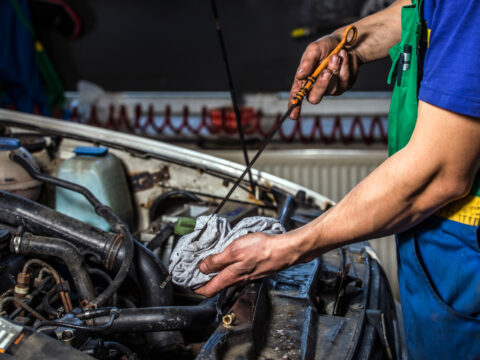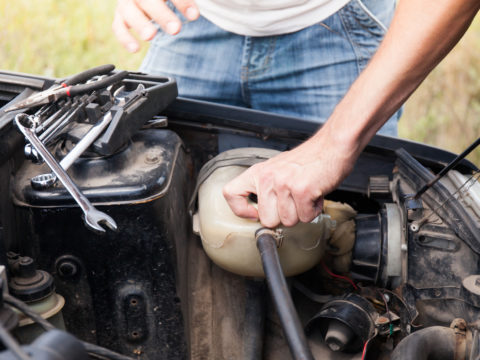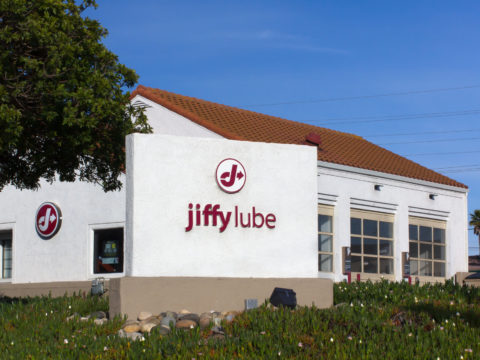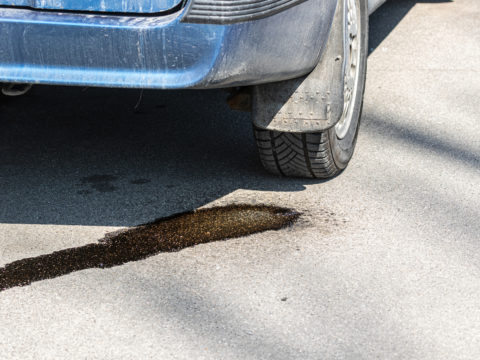The oil in your vehicle engine should never smell like gas. If it does, you need to figure out why your oil has gas in it.
In some cases, gasoline being present in the oil can be very serious. Left alone, gas in engine oil can damage the engine significantly.
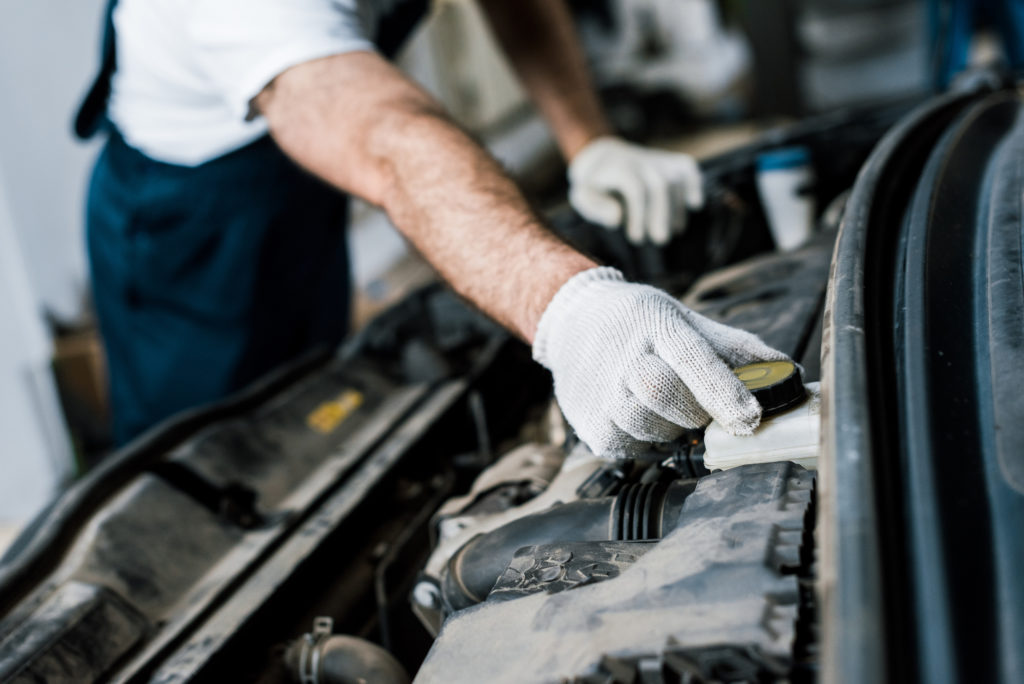
Contents
Is Engine Oil Supposed to Smell Like Gas?
Your oil should never smell like gasoline. An internal combustion engine needs gasoline to create the energy to propel your vehicle. The engine uses oil to lubricate the parts in the engine that create the energy to move the vehicle.
The oil and gasoline in your engine should never mix. If the gas mixes with the oil in your engine, an accident could happen, or you could end up having a malfunctioning part or system. If you ignore the mixture, the gasoline in your oil could also damage your engine.
When an engine’s oil and gasoline mix, the oil smells faintly like gasoline.
What Does It Mean if the Oil Smells Like Gas?
The simplest answer to that question is that if your engine’s oil smells like gasoline, it means the gasoline has found a way to leak into your oil reservoir.
A more complex answer is that gasoline leaks into your oil because of an accidental spill or because a part or system in your engine malfunctioned or broke.
Abstractly, it means you have a serious issue you must figure out and address before it becomes a crisis for your engine.
What Causes Oil to Smell Like Gas?
There are several ways that gasoline can get into your oil. Some are not as critical as others. Any time oil gets in your gas; however, you must address it as soon as you are able.
Here are 10 ways gasoline can get into your engine’s oil.
1) Driving for Short Distances
A small amount of gasoline will always find its way into your engine oil. It is only when the amount of gasoline affects the oil’s performance that it becomes worrisome. When you drive long distances, the oil in your engine heats up enough to vaporize any gasoline in your oil.
If, however, you mostly drive short distances or suddenly drive short distances after driving long distances for most of the life of your vehicle, the gasoline in your oil will not heat up enough to vaporize. When that happens, you likely will start to smell gasoline around your vehicle when it is running.
If you plan on only driving short distances, more frequent oil changes will migrate the small amount of gasoline in your oil out of circulation.
2) Bad Fuel Injectors
The air-fuel mixture in your engine is very important. When a fuel injector is bad, the air-fuel ratio can be distorted. This can lead to gasoline not combusting thoroughly and finding its way into the crankcase as gravity forces it to fall through the engine.
3) Bad Piston Rings
An engine’s piston rings create a seal that prevents oil from passing into the combustion chamber. That prevents fuel from dripping down into the crankcase. Like every other part of your vehicle, piston rings will wear out over time.
At first, a ruptured or cracked piston ring will not allow that much oil to get into the combustion chamber. As the seal degrades, however, more oil will slip through. Eventually, the amount of oil that gets through into the combustion chamber can be significant.
Once the oil gets into the combustion chamber, it makes its way back into the crankcase and brings any residual gasoline with it. As time passes, the amount of gasoline in the crankcase will become noticeable.
4) Misfiring Engine
There are many reasons your vehicle’s engine might misfire. Poor engine combustion, fouled fuel injectors, inadequate air-fuel ratio, and tainted fuel are just a few examples.
When an engine misfires, gasoline will not burn thoroughly. When gasoline does not combust properly, it ends up in the crankcase.
5) Fouled Fuel
Just about every gasoline station will sell fouled fuel at some point. The bad gas might be from the distributor. Another source is the storage tanks the station uses, which might have ruptured and allowed a foreign substance to seep in. The fouling agent could be water, dirt, or debris.
When you put fouled fuel in your vehicle, some will not burn as efficiently as is needed to ensure it does not remain a liquid. If that happens, the unburnt gasoline will drip down into the crankcase and infect the oil reserve in the crankcase.
6) Rich Fuel
A vehicle’s engine is designed to run with a specific air to fuel ratio. If that ratio is messed up it affects the performance of the vehicle. If too much fuel is sent into the combustion chamber, not all of it will burn. Unburnt fuel will eventually pass through to the crankcase.
An unbalanced fuel to air ratio can happen because of damaged fuel injectors or MAP sensors, bad airflow sensors, and oxygen sensors that are bad or going bad. Additionally, in older vehicles, the carburetor may not be calibrated correctly.
7) Dirty Oil
Over time, if you do not change your oil, the amounts of gasoline that end up in your engine’s crankcase can build up. At first, or if you change your oil regularly, you may not notice the buildup. In fact, if the gasoline in your oil is not significant, you may not notice it at all. Only after the oil is really old, the gasoline will have built up enough to be noticed.
If, however, you go a long time between oil changes, the total amount of gasoline can become very noticeable. Usually, when the gasoline in engine oil surpasses 3% of the total, the oil will smell like gasoline. As it increases beyond that, the smell will become more obnoxious.
8) Mistakenly Adding Gasoline Via the Oil Port
Adding gasoline to oil by mistake will not usually happen to anyone that has a mechanic service their vehicle. When, however, someone services a vehicle by themselves, there is a small risk that gasoline gets poured into the crankcase.
It is rare when this happens and usually due to storing gas and oil in separate but similar-looking containers. A key to avoiding this if you service your engine is to make sure the two containers are distinctly marked.
9) Stuck Fuel Injectors
When fuel injectors are damaged or fouled with gunk, they can remain stuck in an open position. Injectors that are stuck open let fuel leak into the combustion chamber and not be used by the engine. It then can seep into the oil supply.
If your injectors are stuck open, your oil will smell like a lawnmower. Left untreated, if the gasoline leaking is considerable, the engine can be severely damaged and even ruined.
10) Older Vehicles with Carburetors
Older engines have a carburetor, and a diaphragm manages the fuel level. When the gas pedal is depressed, gas goes into the diaphragm. A gas pedal can be depressed for too long, or the butterfly valve that controls the airflow can remain open. This can mess up the air to fuel ratio.
That can lead to gasoline coating the combustion chamber walls and not igniting. Eventually, gas will seep down the walls into the crankcase, fouling the oil.
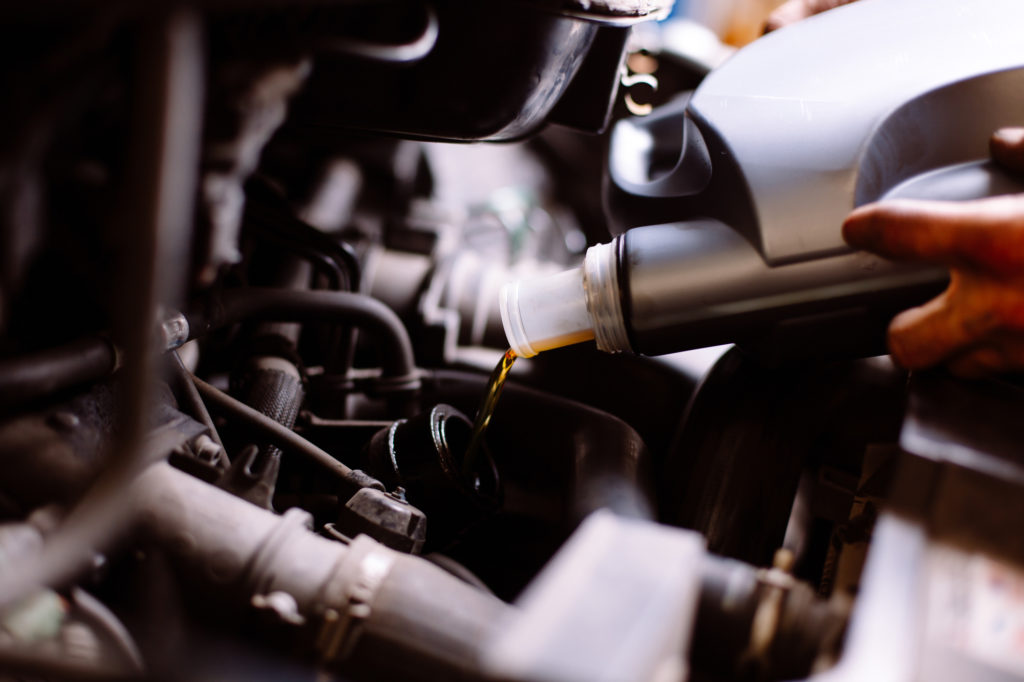
How to Check for Fuel in Oil
Checking for gasoline in your oil is simple, although if you suspect you have gasoline in your oil, you should get your vehicle to a mechanic for inspection.
Smell Your Engine’s Dipstick
Let your engine cool and remove your dipstick. If gasoline is present in your oil, you will smell it.
Drain the Oil, Inspect and Smell It
Once your oil is cool, remove the oil plug under your vehicle in the oil pan and let it drain. Once it has drained, look for a gasoline residue on top of the oil. Also, waft the oil vapors to you and smell the gasoline.
Measure the Oil Level
There are a few ways you can do this. If you start to smell gasoline, check the oil level before driving. Check the oil level again when it has cooled after your drive. If the level of oil increases over what it was before you drove, follow the other two methods to see if you have evidence of gasoline in your oil.
If you think you have an active gasoline leak, you can measure the oil level when you change the oil. You can then measure it after a few hours. It will increase as oil drips into the pan but should not increase more than a quarter inch.
Look Out for White Smoke Exhaust
When gasoline gets in the oil system, some gasoline passes through the exhaust system and burns, creating white smoke. In most cases, the smoke is not noticeable, but if a lot of gasoline is present, the white smoke is hard to ignore.
Will Gas in Oil Harm the Engine?
Left alone, gasoline in the oil system can lead to damaging your engine quite extensively. There are three principal ways:
Lost Viscosity
Oil is more viscous than gasoline. Reduced viscosity means it lubricates better. Gasoline in the oil supply can dilute the oil and reduce its viscosity. When that happens, a few things can happen:
- The engine runs hotter
- Engine components overheat
- The oil loses its lubricating effectiveness
Increased Wear and Tear
When the viscosity of an oil supply degrades, heat and pressure will increase the rate of wear and tear. That means engine components can wear out quicker.
In some cases, fixing a worn-out component can cost thousands of dollars or may not even be worth it because the fix costs more than the vehicle is worth.
Heat Damage
When oil does not lubricate properly, engine parts overheat. If the heating becomes severe, the engine can stop running. Heat also increases pressure internally, causing a head gasket to rupture.
Poor Fuel Economy
The more gasoline leaking into your oil, the less fuel you have to run on. If the problem is acute, you can lose a noticeable amount of fuel.
Additionally, increased fuel loss can result in less engine power. Less engine power can result in your miles per gallon ratio decreasing. The total amount of gasoline you have to burn is less than the amount you put into the vehicle when you gassed up.
What to Do if You Smell Gas in Your OIl
The fixes for gasoline in your vehicle’s oil supply run from simple to complex, inexpensive to very expensive, and in some cases, addressing the issue is not worth the cost.
Have a Mechanic Look at the Engine
As soon as you can, have a mechanic look at your engine. Even if the mechanic only notices what you have, it is verification that you have an issue to deal with. Additionally, a mechanic is highly trained and can recommend a fix.
If the Problem Is Not Obvious
The mechanic might not be able to pinpoint the problem. At that point, they might recommend specific actions. Those might range in costs, but at least you can choose how to move forward.
One suggestion they make might be to examine the piston rings. The piston rings create a seal that keeps the oil inside the cylinder and prevents gasoline from leaking into the oil pan.
Gasoline will seep into the engine oil if the piston rings wear out.
If that happens, replacing the piston rings is the only way to stop the seepage. Generally, testing this is the only way to examine the smoke your vehicle emits. If the smoke is thick and white, your vehicle is burning too much gasoline, and the piston rings are bad.
Once you replace the piston rings, the oil needs to be changed, and you need to run the vehicle to see if the leakage stops.
In every case, whether you go to a mechanic or not, the fixes for gasoline in your oil start with changing out the engine oil and oil filter.

